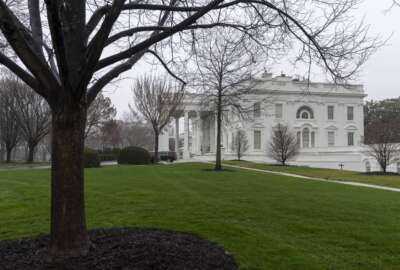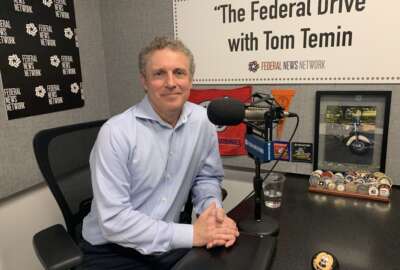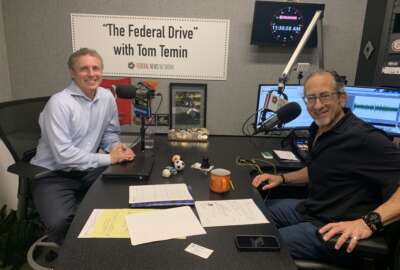The Hatch Act ahead of Election Day: What’s new, plus a review
In the years since the 2020 election, the Office of Special Counsel has made a few tweaks to what’s OK — and not OK — for feds to do under the Hatch Act.
Many federal employees may be familiar with the Hatch Act, but as Election Day nears, several recent updates to the law make it well worth revisiting.
The Hatch Act, a law dating back to 1939, generally prohibits civil servants, while at the federal workplace or on duty, from expressing support or opposition for a political party or candidate. In the years since the 2020 election, though, the Office of Special Counsel has made multiple changes to what’s OK — or not OK — for feds to do while they’re on the clock.
With the approaching presidential election, the perhaps most important change relates to when feds can display campaign items in the workplace. In a May 2024 advisory opinion, OSC determined that contemporary political memorabilia is now barred from the workplace year-round — not just before Election Day. It’s a notable difference considering that previously, federal employees weren’t expressly prohibited from showing support or opposition for a particular candidate after Election Day had passed.
OSC said it opted for a year-round prohibition on political campaign items for several reasons. First, the agency said there has been a growing association between presidential candidates and political parties, both before and after Election Day. The change is also meant to create a “straightforward and uniform standard” for federal employees to follow without getting bogged down in specific dates of when someone starts or stops being a candidate. It also aims to remove confusion around what can be expressed about individuals running for re-election.
OSC’s advisory opinion from May additionally determined that former federal employees could face charges from Hatch Act violations they may have committed while previously working for the government. On top of that, OSC will now hold non-Senate-confirmed White House officials to the same Hatch Act standards as all other career federal employees.
Along with the recent Hatch Act changes from OSC, several provisions are especially important to review as November quickly approaches.
Leave your campaign mug at home … and off-camera
Presidential election season is busy for anyone who’s in or around the federal government, but that may be especially true for OSC. As an independent agency with authority to investigate and bring cases before the MSPB, OSC oversees and investigates federal employees’ actions in the workplace.
Over the years, different OSC leaders have had various approaches to how the Hatch Act should be enforced. Those rules become especially important leading up to, and following, a presidential election season.
Special Counsel Hampton Dellinger said one of OSC’s goals is to proactively educate feds on the Hatch Act, so their actions don’t turn into issues later on. Generally, it’s better for federal employees ask permission, not forgiveness.
“We urge federal employees to call us on the front end to ask questions about the Hatch Act,” Dellinger said in a recent interview on The Federal Drive. “We are very focused on education and training in addition to our enforcement work.”
Many of the Hatch Act’s rules are fairly straightforward, like not bringing any campaign buttons, hats, shirts, signs — or really any type of political memorabilia — to work. But there are plenty of nuances in those rules too. As OSC has clarified in the years since the COVID-19 pandemic, face masks that display political images or slogans are also prohibited.
The ban on political memorabilia extends to federal employees working on virtual platforms as well. Teleworking employees dialed into a Microsoft Teams or Zoom meeting for work shouldn’t, for example, wear a campaign hat or have a political mug in view of their laptop camera.
“There are a lot of things you can use to have your cup of coffee or tea,” Dellinger said. “Just leave the campaign mug at the house.”
But the rules of the Hatch Act are about more than just the shirts feds wear or the cups they drink from — the law also defines the parameters for federal employees can say and do at work, in a political sense.
“Of course, government employees have a voice — an important voice — and my office is very focused on the speech rights of federal employees,” Dellinger said. “But at the same time, that public voice has to be used in the public interest, not for political interests.”
For example, participating in political activities like attending a campaign rally is allowed, but federal employees have to distinguish that they’re acting in a personal capacity, and only take part in those activities while off the clock.
“When you are enjoying your non-work life, that’s when your full free speech first amendment rights should be enjoyed,” Dellinger said. “When you’re on the job, when you’re on the clock as a federal employee, that’s where your focus needs to be the public good and not partisan ends.”
“Less” vs. “further” restricted under the Hatch Act
The Hatch Act splits federal employees into two distinct categories — “further restricted” employees and “less restricted” employees, each with its own marked differences on what those feds can or cannot do under the law.
Employees at most intelligence agencies, the Federal Election Commission, OSC, the Merit Systems Protection Board and some components of the Treasury Department mostly fall into the “further restricted” category. That more restricted category also includes career members of the Senior Executive Service, administrative law judges and administrative appeals judges.
Senate-confirmed political appointees are classified as “less restricted,” as are the majority of career federal employees. Political appointees, however, are generally exempt from the rules around “on-the-clock” political activities. And as of May, White House officials now fall into that “less restricted” category as well.
Employees between the two categories differ in what they can or can’t do in the workplace. “Further restricted” employees, for instance, cannot take part in political campaigning at any time, such as handing out brochures at a polling location on Election Day. But “less restricted” federal workers can participate in campaigning activities, as long as they’re not doing so on government time.
On social media, the rules around the Hatch Act can also get a little complicated. For example, both “less restricted” and “further restricted” employees can express their political opinions online, as long as it’s not — again — while at work or on duty. But on social media, there are a few caveats for “further restricted” feds. They can’t, for example, link to, share or retweet any posts from political candidates’ social media accounts.
Federal employees can find answers to many frequently asked questions on the Hatch Act, like the rules around listening to political podcasts at work, or having a campaign sticker on your car that’s parked in a government parking lot (both of these are OK, by the way).
OSC also has an entire list of “dos and don’ts” for both “further restricted” and “less restricted” feds on its website.
Copyright © 2024 Federal News Network. All rights reserved. This website is not intended for users located within the European Economic Area.
Drew Friedman is a workforce, pay and benefits reporter for Federal News Network.
Follow @dfriedmanWFED






